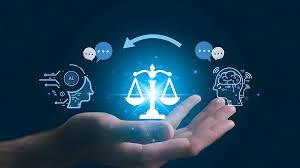In the rapidly advancing field of technology, one of the most fascinating and swiftly evolving areas is the integration of Artificial Intelligence (AI) into various societal domains. As AI systems become more advanced, they are increasingly applied in sectors such as healthcare, finance, transportation, and entertainment. However, this growing presence of AI also introduces significant legal issues and challenges that require careful examination and regulation. It is crucial to explore how the law interacts with AI, including the legal frameworks, ethical considerations, and emerging issues in this evolving field.
As technology progresses at a breakneck speed, AI’s integration into different aspects of society is becoming more common. The legal field is notably impacted by AI, both influenced by its capabilities and positioned to guide its development. As AI evolves, it presents both opportunities and challenges for legal systems worldwide.
AI has quickly become a transformative force in various industries, including healthcare and finance. Yet, its most profound and complex impact is in the legal domain. As AI technologies continue to advance, they offer unprecedented opportunities and pose intricate challenges for the legal profession and society. This article explores the intersection of law and AI, examining implications, debates, and future directions in this dynamic area.
AI Legal Frameworks
The use of AI in law is growing, driven by demands for greater efficiency, accuracy, and cost-effectiveness. Legal professionals are adopting AI-powered tools for tasks like contract review, legal research, predictive analytics, and document automation. These technologies promise to improve workflows, decision-making, and access to justice.
However, AI’s integration challenges existing legal frameworks. Traditional laws often struggle to keep up with AI’s rapid advancements, resulting in ambiguity regarding liability, accountability, and ethical standards. Policymakers are working to create comprehensive regulations for AI.
Some countries have introduced specific legislation or guidelines to address these challenges. For example, the EU’s General Data Protection Regulation (GDPR) includes provisions on automated decision-making and profiling to protect individual rights in the AI era. Similarly, the US and Canada are developing regulatory frameworks to tackle issues like AI bias, transparency, and accountability.
As AI technology advances, new legal challenges arise, testing the limits of existing frameworks. One issue is determining liability for AI-generated outcomes, such as accidents involving autonomous vehicles. Questions about responsibility—whether it lies with the manufacturer, programmer, or user require a nuanced understanding of causality and agency in AI systems.
Another emerging issue is intellectual property rights for AI-generated content. As AI creates works like art, music, and literature, questions about copyright ownership and authorship arise. Current copyright laws typically recognize human creators, leaving uncertainty about the status of AI-generated works.
The rapid pace of AI development has outstripped the creation of comprehensive regulations, leaving policymakers to address issues like data privacy, intellectual property rights, and liability for AI errors. Additionally, integrating AI with traditional legal concepts, such as liability and accountability, introduces new legal questions.
Despite these challenges, AI holds significant promise. It has the potential to democratize access to legal services, bridge the gap between legal expertise and the public, and enhance legal processes. Achieving this potential requires addressing the ethical, regulatory, and societal implications of AI in law, with stakeholders working together to develop robust frameworks for its responsible use.
Challenges
AI’s ethical dimensions have profound societal implications. As AI systems become more autonomous and impact individuals’ lives, issues of fairness, transparency, and bias become critical. For instance, AI algorithms in recruitment or loan approvals may inadvertently perpetuate biases from historical data, leading to discriminatory outcomes.
Addressing these ethical concerns involves collaboration across various fields, including law, ethics, computer science, and sociology. Ethical guidelines like the IEEE Ethically Aligned Design and the Asilomar AI Principles provide frameworks for navigating AI’s ethical complexities.
The integration of AI into the legal domain presents several challenges and ethical considerations. A primary concern is the potential for bias in AI algorithms, which can exacerbate existing disparities in the legal system. If AI systems are trained on biased data or flawed algorithms, they may inadvertently lead to unjust outcomes.
The opacity of many AI algorithms also challenges transparency and accountability in the legal process. Unlike human decision-making, AI algorithms often operate as “black boxes,” making it difficult to understand their reasoning. This lack of transparency raises concerns about due process and the ability to challenge or appeal AI decisions.
Furthermore, the rapid advancement of AI technology poses challenges for legal frameworks and regulations, which may struggle to keep up. Issues such as liability, accountability, and data privacy in AI-generated decisions remain largely unresolved, requiring lawmakers and legal scholars to address complex legal and technological intersections.
Despite the benefits, the adoption of AI in law faces significant challenges. These include concerns about transparency, interpretability, and bias in AI systems. Addressing these issues is crucial to ensure fairness and accountability in AI-driven decision-making.
Additionally, AI’s impact on the legal profession itself raises concerns about job displacement, particularly for tasks traditionally performed by junior associates. However, some argue that AI can complement rather than replace human expertise, allowing legal professionals to focus on more complex and strategic tasks.
The ethical implications of AI in law are multifaceted, involving principles such as competence, confidentiality, and zealous advocacy. Legal practitioners must ensure that AI systems are used ethically and in accordance with legal and professional standards.
AI’s integration into society holds great promise for innovation, but achieving its full potential requires balancing technological advancement with legal and ethical considerations. By developing strong regulatory frameworks, fostering interdisciplinary collaboration, and promoting responsible AI development, we can navigate the complex intersection of law and AI while maximizing benefits and minimizing risks. Addressing these legal challenges and ethical dilemmas is essential for shaping a future that is both innovative and equitable.
~Laksh Verma


They provide access to global brands that are hard to find locally.
buying lisinopril no prescription
Their international catalog is expansive.